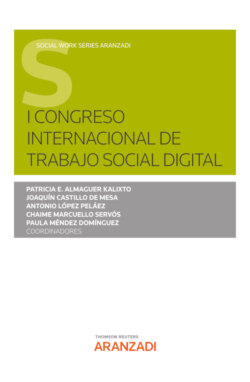Читать книгу I Congreso Internacional de trabajo social digital - Paula Méndez Domínguez - Страница 10
На сайте Литреса книга снята с продажи.
COMMUNICATION 1.4. EDUCATING SOCIAL WORKERS THROUGH A PANDEMIC: CHALLENGES AND SOURCES OF RESILIENCE
ОглавлениеAUTHORS
• Stacy Gherardi, New Mexico State University
• Jason Mallonee, New Mexico State University
SUMMARY
The global impact of the COVID-19 pandemic and related closures in spring 2020 was an unprecedented challenge for higher education broadly and social work education specifically. Universities struggled to synthesize rapidly changing information and public health guidance, working to ensure the safety of students while maintaining the fidelity of their educational programs. Classes rapidly transitioned to online delivery-whether or not instructors and students had the basic infrastructure and preparation to maximize learning in this modality. One study of 897 faculty at 672 U.S. institutions of higher education found that nearly all of them transitioned to emergency methods for teaching and learning which largely encompassed online approaches (Johnson et al. 2020). Most reported the need to modify assignments and expectations as well as the adoption of new instructional methods. While many were able to navigate these challenges, they identified ongoing needs for increased student supports, access to digital materials for learning, and support for navigating the realities of working from home (Johnson et al. 2020).
Social work experienced unique challenges in supporting field-based learning amid stay-at home and public health orders restricting client contact. Field-based learning experiences largely transitioned to remote activity requiring quick mastery of telehealth platforms and techniques or the creation of new and meaningful opportunities for student growth and client service delivery. These challenges have been widely discussed among social work educators but have yet to be formally researched. Despite these challenges, social work is uniquely positioned to integrate lessons learned from the pandemic in order to strengthen curriculum and course delivery methods.
As we move into a new normal and grapple with what social work education will look like in a COVID-positive world, there is much to be learned from the challenges of spring 2020 and the sources of strength and resilience that enabled students and educators to meet those challenges. While it has not yet been theorized in the literature, the integration of current experiences with trauma-informed frameworks and resilience theory presents a significant opportunity for social work education to support students and provide learning opportunities by practicing what we preach. If we are to understand the pandemic and its related consequences as a widespread experience of trauma or toxic stress, frameworks for responding to this through students support and related pedagogy are informative. Sondel et al.’s (2018) pedagogy of political trauma holds particular relevance for our current moment. Their model calls for educators to: 1) tend to students’ socio-emotional well-being; 2) cultivate students’ civic knowledge and capacities; and 3) teach toward critical consciousness, activism, and resistance (p. 179). Similarly, Carello and Butler’s (2015) call to “practice what we teach” with regards to trauma-informed social work education is instructive as they provide several areas in which the trauma-informed principle of safety can help us to transform the learning environment, requirements for student behavior and work, instruc-tor-student interactions, and instruction itself.
This exploratory qualitative study sought to learn from the lived experiences of social work instructors in the United States during the initial months of the COVID-19 pandemic to identify the many ways in which the COVID-19 pandemic impacted social work education and social work students in spring 2020. Participants were recruited through snowball sampling, with invitations to participate shared on several social work and social work education listservs and social media sites. The web-based open-ended survey was available from May 15, 2020 to June 15, 2020. In completing the survey, social work educators described the challenges they and students encountered as well as sources of strength and resilience that allowed people to meet these challenges. Qualitative analysis of open-ended survey items utilized inductive content analysis based on Creswell’s (2012) description of a systematic grounded-theory design.
Participant responses inform key areas for social work education to proactively address, not only in response to COVID-19, but in response to many of the existing social inequities and gaps that the pandemic has highlighted. Responses also provide deep insight into how social work education can enact the values it teaches by embedding resiliencepromoting and protective factors into the explicit and implicit curriculum. These lessons inform the work to be done in the coming months and years, as social work education responds to the long-term impact of the pandemic and the pre-existing social conditions that deepened that impact in the United States.
OBJECTIVES
This study set out to describe ways in which the COVID-10 pandemic impacted social work education, including both challenges and sources of strength and resilience, in order to provide clear and actionable steps that social work programs and faculty can take to support students as these challenges are likely to persist in the coming months and years.
URL: https://youtu.be/jcF8W7pLJ2U
